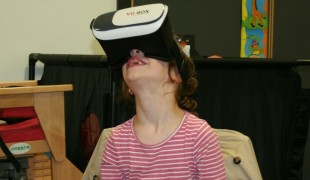- 8118
- 553
- 8
- 9
- 0
- Help Ukraine
Über die Lösung
Richard Elleson ist ein Erfinder, anwalt, und Thomas'father, ein Junge mit zerebraler Lähmung. Er wurde geschult, um ein traditionelles sprech Gerät zu verwenden, aber es war mühsam für ihn Gedanken zum Ausdruck bringen, ein Wort zu einer Zeit, und er gab es auf. Sein Vater dachte, er hatte eine bessere Idee und begann die Entwicklung eines computergesteuerten Geräts zu helfen, sein Sohn leichter zu kommunizieren.
Zu helfen, seinen Sohn zu kommunizieren, Richard widmete seine Energien auf die Schaffung eines kinderfreundliche Form von Sprachtechnologie er zum Tango. Das Gadget prerecords eine Vielzahl von bunten Bildern und Symbolen darstellen häufig verwendete Aktionen, Fragen und Emotionen. Sein Sohn Thomas, können Sie das Gerät verwenden, um einen Gedanken schnell auswählen und der kleine Computer spricht für ihn, mit einer Stimme, so wie seine eigene, die Emotionen mit frases ausdrückt. Thomas kann in einen Modus mit einem Knopfdruck und ändern, dass von einer regulären Stimme zu einem Winseln oder schreien oder ein Flüstern. Das EDV-Gerät kann auch für spezielle Anlässe angepasst werden, so dass vor einem Baseball-Spiel, das Geräusch von cheers heruntergeladen sie für ihr Team so im Stadion ihr Sohn könnte einer der Jungs brüllen für sie sein.
Http://abcnews.go.com/WNT/PersonOfWeek/story?id=2249358: Adaptiert
Sehen Sie das Video: https://vimeo.com/42282589
Diese Lösung enthält keinen Hinweis weder auf die Verwendung von Arzneimitteln, Chemikalien oder biologische Stoffe (einschließlich Lebensmitteln) noch auf invasive Geräte, anstößige, kommerzielle oder inhärent gefährliche Inhalte. Diese Lösung wurde nicht medizinisch validiert. Vorsicht! Wenn Sie irgendwelche Zweifel haben, wenden Sie sich bitte an einen Arzt.
DISCLAIMER: This story was written by someone who is not the author of the solution, therefore please be advised that, although it was written with the utmost respect for the innovation and the innovator, there can be some incorrect statements. If you find any errors please contact the patient Innovation team via info@patient-innovation.com
-
-
807
-
0
-
17676

Proloque2Go - App Menschen zu helfen, zu kommunizieren
CAREGIVING
COMMUNICATION: Communicating, whether by speaking, listening, or other means
Social interaction
Paralysis
Autism
Cerebral Palsy
Brain Stroke
Brain Injury (Abscess, Brain Barrier Defect, Brain Contusion, Brain Hemorrhage, Brain Edema)
Assistive Daily Life Device (to help ADL)
Assistive Technology access
App (Including when connected with wearable)
Tremors
Muscle cramps or spasms
Difficulty coordinating movements
Muscle weakness
Difficulty speaking or understanding speech
Trouble with fine motor skills (e.g., writing, buttoning clothes)
Twitching or involuntary movements (myoclonus)
Acquired language impairment (Aphasia)
Promoting self-management
Managing Neurological Disorders
Building Supportive Community Relationships
Promoting inclusivity and social integration
Improving Speech and Communication
Caregiving Support
Clinical Pathology
Medical Genetics
Neurology
Pediatrics
Rheumatology
Netherlands
-
-
-
586
-
3
-
8623

Vater nutzt virtuelle Realität, um seiner Tochter zu helfen, die am Williams-Syndrom leidet
COMMUNICATION: Communicating, whether by speaking, listening, or other means
Social interaction
foetal alcoholic syndrome
DiGeorge Syndrome
Angelman Syndrome
Neuromuscular Disorders
Assistive Technology access
App (Including when connected with wearable)
Difficulty coordinating movements
Difficulty speaking or understanding speech
Trouble with fine motor skills (e.g., writing, buttoning clothes)
Cognitive impairment
Memory loss
Anxiety
Sensitivity to light or sound
Depression or anxiety
Managing Neurological Disorders
Improving Speech and Communication
Caregiving Support
Medical Genetics
Neurology
Pediatrics
United Kingdom
-
-
-
1001
-
0
-
21554

Ein Hilfsmittel um mit autistischen Kindern in Kontakt zu bleiben
CAREGIVING
COMMUNICATION: Communicating, whether by speaking, listening, or other means
Social interaction
Autism
Assistive Daily Life Device (to help ADL)
Body-Worn solutions (Clothing, accessories, shoes, sensors...)
App (Including when connected with wearable)
Anxiety
Difficulty concentrating or making decisions
Social withdrawal or isolation
Restlessness or feeling slowed down
Loss of interest or pleasure in activities (anhedonia)
Promoting self-management
Managing Neurological Disorders
Preventing (Vaccination, Protection, Falls, Research/Mapping)
Caregiving Support
Child and Adolescent Psychiatry
Medical Genetics
Neurology
Pediatrics
Psychiatry
Israel
-
 de
de